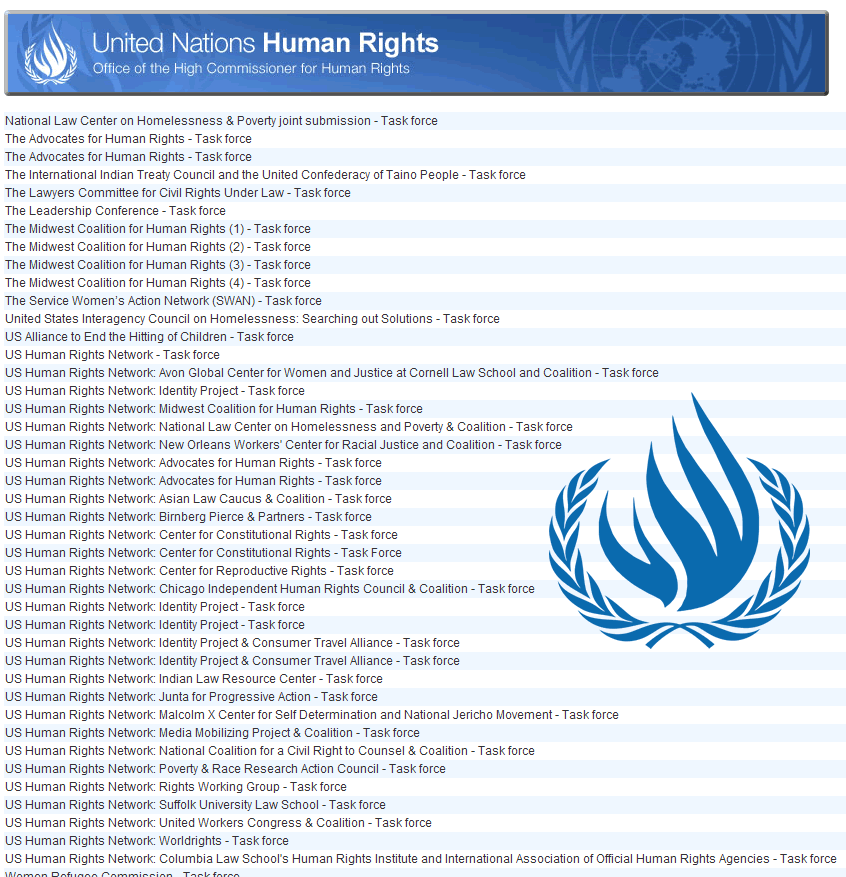On 28 March the United Nations’ Human Rights Commission (HRC) released concluding observations, regarding the United States’ compliance with a major human rights treaty, the International Covenant on Civil and Political Rights (ICCPR). The HRC has urged the US government to overhaul its activities to ensure they comply with US law and conform to US obligations under the treaty.
Of particular interest to Consult Hardesty are sections 7 & 11. (‘State party’ refers to the United States.)
7. Racial Profiling
While welcoming plans to reform the “stop and frisk” program in New York City, the Committee remains concerned about the practice of racial profiling and surveillance by law enforcement officials targeting certain ethnic minorities, and the surveillance of Muslims undertaken by the Federal Bureau of Investigation (FBI) and the New York Police Department (NYPD) in the absence of any suspicion of wrongdoing (Universal Declaration of Human Rights, articles 2, 9, 12, 17 & 26).
The State party should continue and step up its measures to effectively combat and eliminate racial profiling by federal, state and local law enforcement officials, inter alia by: (a) pursuing the review of the 2003 Guidance Regarding the Use of Race by Federal Law Enforcement Agencies and expanding protection against profiling on the basis of religion, religious appearance or national origin; (b) continuing to train state and local law enforcement personnel on cultural awareness and inadmissibility of racial profiling; and (c) abolishing all “stop and frisk” practices.
11. Excessive use of force by law enforcement officials
The Committee is concerned about the still high number of fatal shootings by certain police forces, including, for instance, in Chicago, and reports of excessive use of force by certain law enforcement officers including the deadly use of tasers, which have a disparate impact on African Americans, and use of lethal force by Customs and Border Protection (CBP) officers at the U.S.-Mexico border (Universal Declaration of Human Rights, articles 2, 6, 7 & 26).
The State Party should (a) step up its efforts to prevent the excessive use of force by law enforcement officers by ensuring compliance with the 1990 UN Basic Principles on the Use of Force and Firearms by Law Enforcement Officers; (b) ensure that the new CBP directive on use of deadly force is applied and enforced in practice; and (c) improve reporting of excessive use of force violations and ensure that reported cases of excessive use of force are effectively investigated, alleged perpetrators are prosecuted and, if convicted, punished with appropriate sanctions, that investigations are re-opened when new evidence becomes available, and that victims or their families are provided with adequate compensation.
We are reminded of T. J. Browning’s testimony, in US District Court, regarding a Settlement Agreement proposed by the US Department of Justice and City of Portland, to address police misconduct locally:
“Change is only going to come if somebody bigger and stronger is going to make it happen.”
Unlike the rushed, secret negotiations that produced the above City/DoJ Agreement, these HRC observations followed deliberative, diplomatic exchanges. UN Rapporteurs, national and international agencies, non-governmental organizations and national human rights institutions gave evidence throughout a series of convenings. None of the participants could be surprised by the reasoned conclusions.
We would like to call your attention to an extraordinary body of work, posted as a result. See this page for a small library of position papers on a broad scope of social justice issues. (Scroll down to the US flag, expand the two sections on ‘Civil Society Organizations.’)
Although the list of white papers fails to identify specific issues addressed within, we are certain our partners will find intelligence on a host of social justice issues.


The NAACP was in attendance as the UN HRC took testimony. Here is an excerpt: personal testimony by Kemba Smith. Part of a 30-minute report from Geneva that includes other testimony.
It’s awesome to visit this websitee and reading the views of all
colleagues on the topic off this paragraph, while I am also zealous of
getting experience.